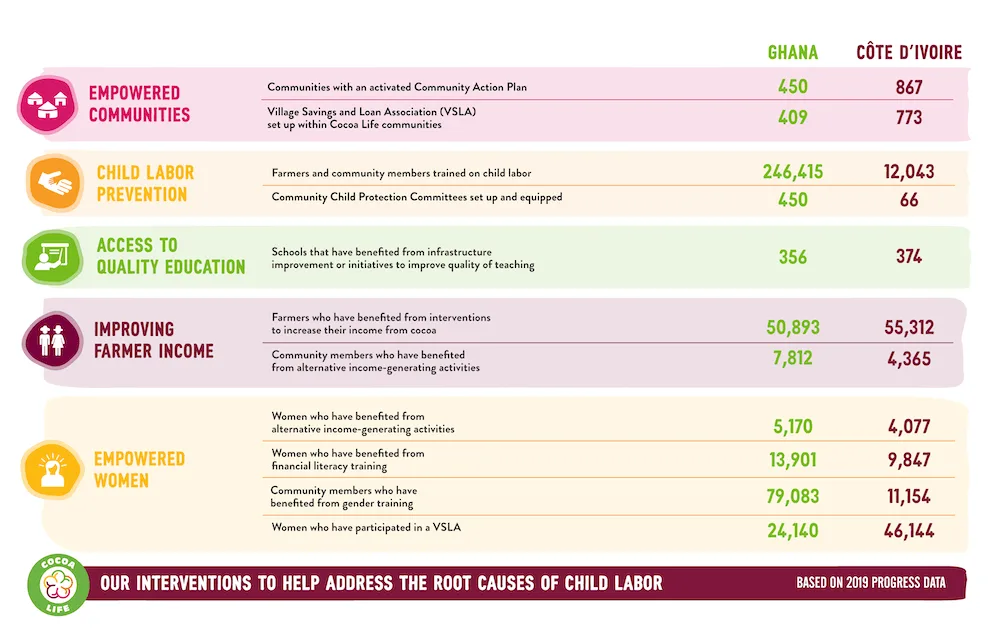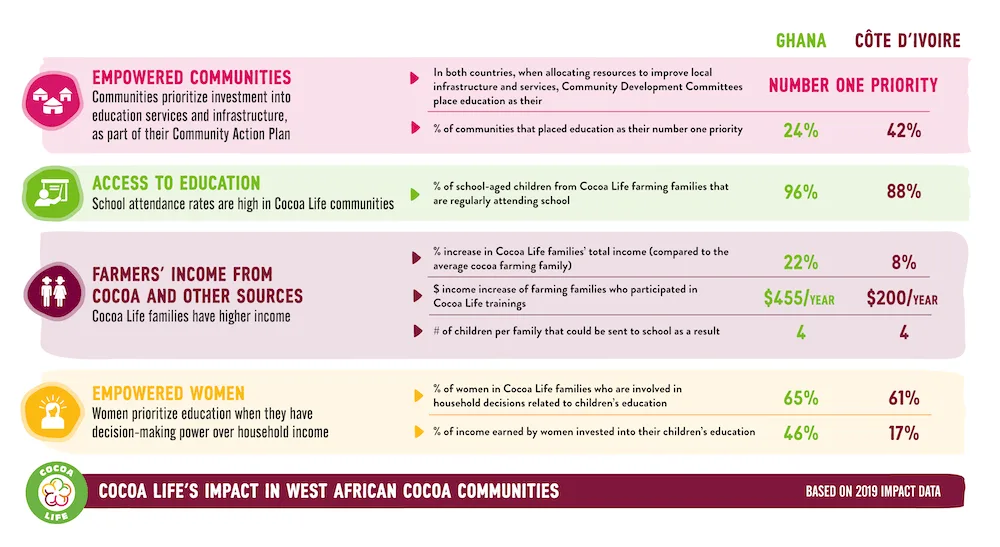PROGRESS BLOG
STEPPING UP EFFORTS TO HELP ADDRESS CHILD LABOR IN WEST AFRICAN COCOA COMMUNITIES
10/19/20
Read more on
Today, the University of Chicago’s National Opinion Research Center (NORC) has released a report commissioned by the US Department of Labor, outlining the cocoa sector’s progress towards ending child labor in the West African cocoa supply chain. At Mondelēz International, we are concerned by the slow sector progress it reports. No amount of child labor in the cocoa supply chain should be acceptable.
Through Cocoa Life, we work on the ground in cocoa communities to make cocoa right. These communities cannot have a thriving future if the rights of children within them are not protected, which is why we believe that children’s work is education and play.
We are encouraged by the NORC sub-study confirming that where industry has intervened, there has been a positive impact on child labor reduction. In Cocoa Life communities, we see that our interventions are having a positive effect on children’s wellbeing and reducing child labor. But we know that collectively as a sector, we should keep working to go further. That’s why we’re stepping up our efforts to help tackle the root causes of child labor through our program’s holistic approach.
We are committed to:
- Scaling up our holistic approach to help prevent child labor in our cocoa supply chain
- Rolling out Child Labor Monitoring and Remediation Systems (CLMRS) across all Cocoa Life communities in West Africa by 2025
- Driving public-private collaboration to channel the sector’s investments towards addressing the root causes of child labor systemically
- Investing $3 million in early childhood development and access to quality education, through a ground-breaking landscape approach led by the Jacobs Foundation, which aims to benefit all children across the cocoa sector of Côte d’Ivoire
- Supporting due diligence legislative efforts that require all actors along the cocoa supply chain to work to identify and address environmental and human rights risks, including child labor
In the context of COVID-19, we are also adapting our interventions to ensure we follow government guidelines within Ghana and Côte d'Ivoire, and are supporting local initiatives through partnerships with Cocobod, Child Rights International, World Cocoa Foundation, Save the Children and CARE International, among others. Our support includes actions to help ensure continued child protection and access to education. Read more about our response to COVID-19 here.
Here we discuss how we will be stepping up our efforts in West Africa through Cocoa Life, at a program level and on the ground - whilst our child labor strategy sets out how we are playing our part to address child labor in the global cocoa supply chain.
AT MONDELĒZ INTERNATIONAL, WE ARE COMMITTED TO MAKING OUR SNACKS THE RIGHT WAY
Cathy Pieters, Global Director Cocoa Life
Delivering on our company’s commitment to do business the right way means protecting the planet and respecting the human rights of people in our value chain. Child labor is a human rights challenge that is common to rural agricultural production in low income regions, and so is not limited to cocoa. It is both a symptom and a self-perpetuating cause of poverty.
Children and their families in the cocoa growing areas of Ghana and Côte d'Ivoire face the realities of poverty and slow rural development, including: lack of education infrastructure, food insecurity, lack of access to potable water, and poor health services. That is why we set up Cocoa Life as a holistic approach, believing it necessary to tackle the root causes and contribute to ending child labor in the cocoa supply chain.
Since Cocoa Life was launched, Mondelēz International has invested $250 million in the program. By 2025, we are committed to sourcing all the cocoa volume for our chocolate from Cocoa Life - meaning we aim to know where the cocoa is grown, and that there is appropriate due diligence in place to help address child labor.
We are encouraged by the progress being made through our Cocoa Life program: being on the ground has allowed us to see the need for even greater sector-wide collaboration. That’s why we are calling for the development of a public-private partnership with industry peers, governments, NGOs, financial and technical partners, to work to systemically address the root causes of child labor. We have already committed to investing $3 million in early childhood development and access to quality education in Côte d'Ivoire, through a multi-stakeholder initiative led by the Jacobs Foundation. We will also support the Foundation’s efforts to expand this initiative to Ghana.
Because it takes action from all actors along the supply chain, we also support the development of mandatory due diligence legislation in the European Union, which would require all companies to work to identify and address risks in their cocoa supply chain. Read more about how we have joined peers and supply companies, as well as NGOs, to strengthen human rights including those of children here.
THROUGH COCOA LIFE, WE ARE MAKING COCOA RIGHT
Virginie Mahin, Global Social Sustainability & Human Rights Lead
At a program level, as of the end of 2019 our holistic approach has enabled us to reach 106,205 cocoa farmers in 589 communities in Ghana and 1,040 communities in Côte d'Ivoire, with preventative interventions specifically designed to address the root causes that can often lead to child labor.
Our data shows that our interventions in West Africa have already reached significant scale. We have worked with 730 schools to increase access to quality education and provided training in Good Agricultural Practices (GAPs) to more than 106,000 farmers so they can increase their income from cocoa - both of which help to reduce the prevalence of child labor in cocoa communities.

We complement our holistic approach with Child Labor Monitoring and Remediation Systems (CLMRS) to work to identify children who are at risk, including cases of hazardous work, and provide targeted remediation support. We are working towards having all Cocoa Life communities in Ghana and Côte d'Ivoire covered by CLMRS by 2025. Alongside this acceleration, we continue to strengthen child protection in both countries, in close partnership with their respective governments.
We share this CLMRS data with those who need it to take action. That includes Community Child Protection Committee members who - alongside our specialized NGO implementers - provide support to vulnerable children, and local child protection authorities, who need it to inform policy and to take action.
ON THE GROUND, OUR INTERVENTIONS ARE DRIVING MEANINGFUL CHANGE
Yaa Peprah Amekudzi, Head of Cocoa Life Ghana
As the head of the Cocoa Life program in Ghana, I see our child labor strategy come to life on the ground. In Ghana, 447 communities are already covered by a CLMRS, which is implemented by specialist Ghanaian NGO Child Rights International, in partnership with the government and child protection authorities.
This CLMRS data shows us that our holistic approach is successful in reducing the rate of child labor. And, thanks to independently measured impact data from IPSOS, we can see how our interventions are driving meaningful change in ways that help to improve children’s wellbeing and tackle the root causes of child labor within our communities.
For instance, as a result of our interventions in Ghana, women in Cocoa Life farming families are investing 46% of their income into their children’s education. In addition, school attendance rates are high in Cocoa Life communities: 96% in Ghana and 88% in Côte d'Ivoire.

TOGETHER, WE CAN DRIVE MEANINGFUL CHANGE
Long-lasting, positive change for children in cocoa-growing regions requires all actors along the chocolate supply chain to step up. The entire sector must join forces to address the data shown in the NORC studies.
Playing our part, and addressing the root causes and systemic issues underlying child labor, is crucial. We encourage all sector players to engage in public-private partnerships, and along with peers, suppliers and NGOs, we call on the EU to strengthen human rights and environmental due diligence requirements of companies in global supply chains, and to implement a smart policy mix to support producing countries and create the enabling environment necessary for businesses to respect human rights.